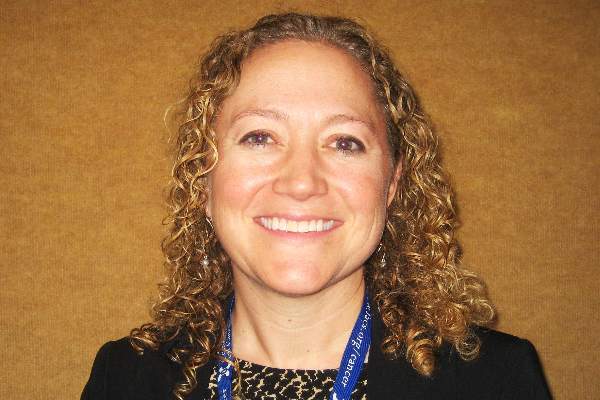User login
SAN FRANCISCO – Hospital charges are not a reliable indicator of quality of care for patients undergoing bariatric surgery, according to results from a cohort study reported at the annual clinical congress of the American College of Surgeons.
Researchers queried the SPARCS (New York Statewide Planning and Research Cooperative System) administrative database and identified 46,180 adult patients who underwent primary bariatric surgery between 2004 and 2010.
Charges for this same surgery differed by more than $10,000 between hospitals with low, bottom-tertile charges (less than $25,027) and hospitals with high, top-tertile charges (more than $35,449), reported Dr. Aurora D. Pryor, chief of the general surgery division and director of the Bariatric and Metabolic Weight Loss Center at the State University of New York at Stony Brook Medical Center.
High-charge hospitals were more often located in New York City or on Long Island. Low-charge hospitals more commonly performed a Roux-en-Y gastric bypass surgical procedure and had proportionately more patients with diabetes and liver disease.
Overall, 24% of the patients were operated on in hospitals with low charges, 26% in those with medium charges, and 50% in those with high charges.
In univariate analysis, the rate of major perioperative complications differed significantly, at 4.1%, 4.8%, and 3.75% for patients undergoing surgery in low-, medium-, and high-charge hospitals, respectively. But in multivariate analysis that controlled for patient demographics, comorbidities, insurance provider, and operative procedure, differences were no longer significant.
Additionally, the hospitals were statistically indistinguishable with respect to rates of 30-day mortality and mortality beyond that time point.
“Hospital charge does not correlate with outcomes following bariatric surgery. The initial differences we think are really based on the higher-risk patients and higher-risk operations performed at the lower-cost centers,” Dr. Pryor proposed.
“I think we should be paying attention to the charges. They vary by geographic location, and I think it’s the higher-cost areas that have the higher charges,” she commented.
Session attendee Dr. Mark Ott, a surgeon with Intermountain Healthcare in Murray, Utah, asked, “So do you think if the patients had that information that they would travel outside New York City to go to a lower-cost center?”
“I think they might actually do that,” Dr. Pryor replied. “In particular, some of the self-pay patients are driving into New York City because they think they’ll have a better outcome, and maybe they should actually pay attention to the outcomes at their local places more.”
Dr. Benedict C. Nwomeh, one of the session’s comoderators and a pediatric surgeon at Nationwide Children’s Hospital, Columbus, Ohio, asked, “So what do you think is responsible for this disparity in charges?”
“I honestly think it’s the city effect and the cost of living in those places, that they are able to charge more for their patients,” Dr. Pryor replied.
In an interview, Dr. Maureen A. Killackey, the other comoderator and clinical director of the New York-Presbyterian/Lawrence Hospital Cancer Center in Bronxville, N.Y., commented, “This study is quite provocative, and it also adds to the body of evidence that we already have, like in colonoscopy, on the variation in charges. This information probably needs to get to the attention of both the private payers as well as the governmental payers, because it really does show a tremendous discrepancy.”
“New York is a highly regulated state, and I think this would be perhaps very interesting to the governmental payers of the state to see these differences in both charges as well as practices, as well as the case-mix index and the geographic access and utilization of these services,” she added.
Dr. Pryor disclosed that she had no relevant conflicts of interest.
SAN FRANCISCO – Hospital charges are not a reliable indicator of quality of care for patients undergoing bariatric surgery, according to results from a cohort study reported at the annual clinical congress of the American College of Surgeons.
Researchers queried the SPARCS (New York Statewide Planning and Research Cooperative System) administrative database and identified 46,180 adult patients who underwent primary bariatric surgery between 2004 and 2010.
Charges for this same surgery differed by more than $10,000 between hospitals with low, bottom-tertile charges (less than $25,027) and hospitals with high, top-tertile charges (more than $35,449), reported Dr. Aurora D. Pryor, chief of the general surgery division and director of the Bariatric and Metabolic Weight Loss Center at the State University of New York at Stony Brook Medical Center.
High-charge hospitals were more often located in New York City or on Long Island. Low-charge hospitals more commonly performed a Roux-en-Y gastric bypass surgical procedure and had proportionately more patients with diabetes and liver disease.
Overall, 24% of the patients were operated on in hospitals with low charges, 26% in those with medium charges, and 50% in those with high charges.
In univariate analysis, the rate of major perioperative complications differed significantly, at 4.1%, 4.8%, and 3.75% for patients undergoing surgery in low-, medium-, and high-charge hospitals, respectively. But in multivariate analysis that controlled for patient demographics, comorbidities, insurance provider, and operative procedure, differences were no longer significant.
Additionally, the hospitals were statistically indistinguishable with respect to rates of 30-day mortality and mortality beyond that time point.
“Hospital charge does not correlate with outcomes following bariatric surgery. The initial differences we think are really based on the higher-risk patients and higher-risk operations performed at the lower-cost centers,” Dr. Pryor proposed.
“I think we should be paying attention to the charges. They vary by geographic location, and I think it’s the higher-cost areas that have the higher charges,” she commented.
Session attendee Dr. Mark Ott, a surgeon with Intermountain Healthcare in Murray, Utah, asked, “So do you think if the patients had that information that they would travel outside New York City to go to a lower-cost center?”
“I think they might actually do that,” Dr. Pryor replied. “In particular, some of the self-pay patients are driving into New York City because they think they’ll have a better outcome, and maybe they should actually pay attention to the outcomes at their local places more.”
Dr. Benedict C. Nwomeh, one of the session’s comoderators and a pediatric surgeon at Nationwide Children’s Hospital, Columbus, Ohio, asked, “So what do you think is responsible for this disparity in charges?”
“I honestly think it’s the city effect and the cost of living in those places, that they are able to charge more for their patients,” Dr. Pryor replied.
In an interview, Dr. Maureen A. Killackey, the other comoderator and clinical director of the New York-Presbyterian/Lawrence Hospital Cancer Center in Bronxville, N.Y., commented, “This study is quite provocative, and it also adds to the body of evidence that we already have, like in colonoscopy, on the variation in charges. This information probably needs to get to the attention of both the private payers as well as the governmental payers, because it really does show a tremendous discrepancy.”
“New York is a highly regulated state, and I think this would be perhaps very interesting to the governmental payers of the state to see these differences in both charges as well as practices, as well as the case-mix index and the geographic access and utilization of these services,” she added.
Dr. Pryor disclosed that she had no relevant conflicts of interest.
SAN FRANCISCO – Hospital charges are not a reliable indicator of quality of care for patients undergoing bariatric surgery, according to results from a cohort study reported at the annual clinical congress of the American College of Surgeons.
Researchers queried the SPARCS (New York Statewide Planning and Research Cooperative System) administrative database and identified 46,180 adult patients who underwent primary bariatric surgery between 2004 and 2010.
Charges for this same surgery differed by more than $10,000 between hospitals with low, bottom-tertile charges (less than $25,027) and hospitals with high, top-tertile charges (more than $35,449), reported Dr. Aurora D. Pryor, chief of the general surgery division and director of the Bariatric and Metabolic Weight Loss Center at the State University of New York at Stony Brook Medical Center.
High-charge hospitals were more often located in New York City or on Long Island. Low-charge hospitals more commonly performed a Roux-en-Y gastric bypass surgical procedure and had proportionately more patients with diabetes and liver disease.
Overall, 24% of the patients were operated on in hospitals with low charges, 26% in those with medium charges, and 50% in those with high charges.
In univariate analysis, the rate of major perioperative complications differed significantly, at 4.1%, 4.8%, and 3.75% for patients undergoing surgery in low-, medium-, and high-charge hospitals, respectively. But in multivariate analysis that controlled for patient demographics, comorbidities, insurance provider, and operative procedure, differences were no longer significant.
Additionally, the hospitals were statistically indistinguishable with respect to rates of 30-day mortality and mortality beyond that time point.
“Hospital charge does not correlate with outcomes following bariatric surgery. The initial differences we think are really based on the higher-risk patients and higher-risk operations performed at the lower-cost centers,” Dr. Pryor proposed.
“I think we should be paying attention to the charges. They vary by geographic location, and I think it’s the higher-cost areas that have the higher charges,” she commented.
Session attendee Dr. Mark Ott, a surgeon with Intermountain Healthcare in Murray, Utah, asked, “So do you think if the patients had that information that they would travel outside New York City to go to a lower-cost center?”
“I think they might actually do that,” Dr. Pryor replied. “In particular, some of the self-pay patients are driving into New York City because they think they’ll have a better outcome, and maybe they should actually pay attention to the outcomes at their local places more.”
Dr. Benedict C. Nwomeh, one of the session’s comoderators and a pediatric surgeon at Nationwide Children’s Hospital, Columbus, Ohio, asked, “So what do you think is responsible for this disparity in charges?”
“I honestly think it’s the city effect and the cost of living in those places, that they are able to charge more for their patients,” Dr. Pryor replied.
In an interview, Dr. Maureen A. Killackey, the other comoderator and clinical director of the New York-Presbyterian/Lawrence Hospital Cancer Center in Bronxville, N.Y., commented, “This study is quite provocative, and it also adds to the body of evidence that we already have, like in colonoscopy, on the variation in charges. This information probably needs to get to the attention of both the private payers as well as the governmental payers, because it really does show a tremendous discrepancy.”
“New York is a highly regulated state, and I think this would be perhaps very interesting to the governmental payers of the state to see these differences in both charges as well as practices, as well as the case-mix index and the geographic access and utilization of these services,” she added.
Dr. Pryor disclosed that she had no relevant conflicts of interest.
AT THE ACS CLINICAL CONGRESS
Key clinical point: Hospitals charging more do not have lower adjusted morbidity or mortality.
Major finding: Patients undergoing surgery at hospitals with higher and lower charges had similar risks of complications and death.
Data source: A cohort study of 46,180 patients in New York who underwent bariatric surgery.
Disclosures: Dr. Pryor disclosed that she had no relevant conflicts of interest.


